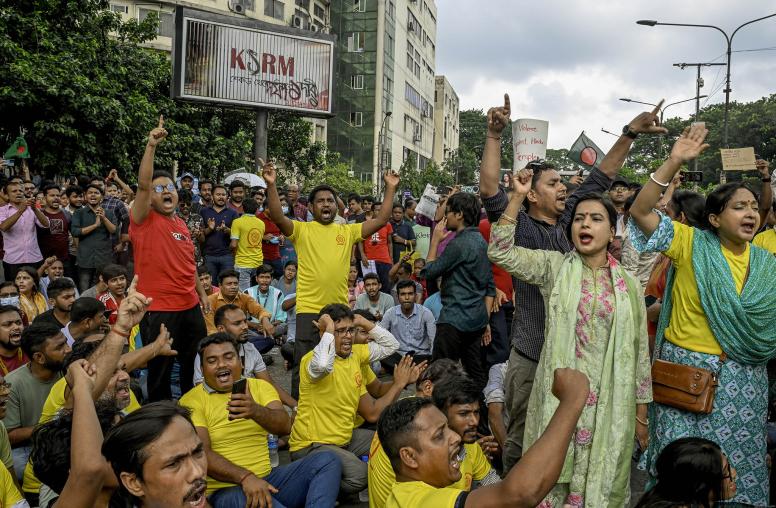Research & Analysis
U.S. Institute of Peace’s articles, reports, tools and other features provide policy analysis, research findings, and practitioner guides. These publications examine critical conflict issues at the center of the Institute’s work to prevent and resolve violent conflict.
The views expressed in these publications are those of the author(s).

The Current Situation in North Korea
In 2018, reinvigorated diplomacy and reduced tensions generated hope for a more secure and peaceful Korean Peninsula. At a historic summit in Singapore in June, the United States and North Korea committed to establish “new U.S.-DPRK relations” while North Korea also committed to work toward the “complete denuclearization of the Korean Peninsula.” However, the two countries disagreed about what each side should concede and when, leading to a diplomatic failure at a subsequent summit in Hanoi in February 2019. Today, the United States and North Korea coexist in an antagonistic, high-risk stalemate.

Jordan’s King Walks a Diplomatic Tightrope in Washington
Jordan has long been one of the United States closest allies in the Middle East and its leader, King Abdullah II, is typically the first Arab leader to meet with a new U.S. president. But when Abdullah met with President Donald Trump on Tuesday, the two leaders had to navigate profound differences over what happens next in Gaza amid a fragile cease-fire. Trump’s proposal to relocate Gazans to Egypt and Jordan has been met with sharp rejection by both countries and the broader region. The president has suggested that he may withhold aid to Egypt and Jordan if they don’t agree to take Palestinians from Gaza.

Six Months After the July Uprising, Bangladesh’s Democracy Lurches Forward
Six months after Bangladesh’s repressive Awami League (AL) government was overthrown in a student-led uprising, Bangladesh’s democratic reformation is entering a critical phase. The reform commissions setup by Muhammad Yunus’s interim government (IG), which took power on August 8, are set to release their recommendations for dramatic changes to the country’s democratic institutions. Under Yunus’s stewardship, political parties and student leaders will now sit to forge a consensus on what reforms to pursue and when to hold elections. A breakdown of these negotiations would blunt momentum toward much-needed reforms and could tilt the country into political chaos.

Joseph Sany on the Rwanda-DRC Conflict and the Risk of Regional War
After decades of poor governance, ethnic tensions and illegal resource exploitation in the mineral-rich eastern Democratic Republic of the Congo, Rwandan-backed rebels’ capture of Goma “has the potential to bring … seven countries into [the] conflict” and ignite a wider regional war, says USIP’s Joseph Sany.

The Current Situation in Burma
Following 10 years of gradual progress on political and economic liberalization—and a landslide victory for the NLD in the 2020 election—the Burmese army took power in a coup on February 1, 2021, just hours before the newly elected members of Parliament were set to convene. The army has quickly reversed hard-won progress toward democracy and human rights in Burma. It has arrested elected officials, activists, and journalists, done away with even the most basic civil and political rights, blocked access to social media, and, intermittently, to the internet entirely.
The Current Situation in China
The Institute’s work on China has two primary objectives: preventing violent conflict between the United States and China and countering China’s destabilizing behavior and malign influence in other countries that could potentially draw the United States into a costly war.

The Current Situation in Iraq
Iraq continues to recover from cycles of conflict that have displaced millions of people and caused widespread destruction. As the country rebuilds domestically and reintegrates into the region and the international community, it also needs to improve governance, diversify its economy and address water insecurity, among other challenges. Iraq also continues to grapple with the lasting human legacies of ISIS, including the reintegration of returnees from al-Hol camp in Northeast Syria and internally displaced persons.

The Current Situation: Israel, The Palestinian Territories, Egypt and the Levant
For over seven decades, the Israeli-Palestinian conflict — and its broader regional reverberations — has shaped Middle East politics and impacted U.S. interests in the region. Hamas’ unprecedented terror attack on October 7, 2023, the Israeli military response in Gaza and the implications for neighboring Jordan and Egypt — as well as seismic ripples in Lebanon and Syria — have sparked a new phase in the conflict’s and the region’s trajectory.

The Risks of South Korea’s Nuclear Armament Under a Troubled Democracy
On President Donald Trump’s first day in office, he referred to North Korea as a “nuclear power.” Just a few months before, North Korean dictator Kim Jong Un said he would “exponentially” increase his country’s nuclear weapons arsenal, which he followed by testing a new intercontinental ballistic missile and a new hypersonic missile. Additionally, there are concerns that Moscow may transfer sensitive military technologies to North Korea in exchange for Pyongyang supplying weaponry and troops for Russia’s war on Ukraine. These developments inject new urgency into a key question that will have major ramifications for stability and security on the Korean Peninsula and beyond: Should South Korea go nuclear?
The Current Situation in Libya
Libyan oil makes up approximately 3 percent of the world’s proven oil reserves and 41 percent of the proven reserves in Africa. Its geographic position on the Mediterranean Sea makes it a crossroads between Europe and Africa, and its proximity to NATO’s southern flank makes Libya a frontline state in the global competition between great powers.